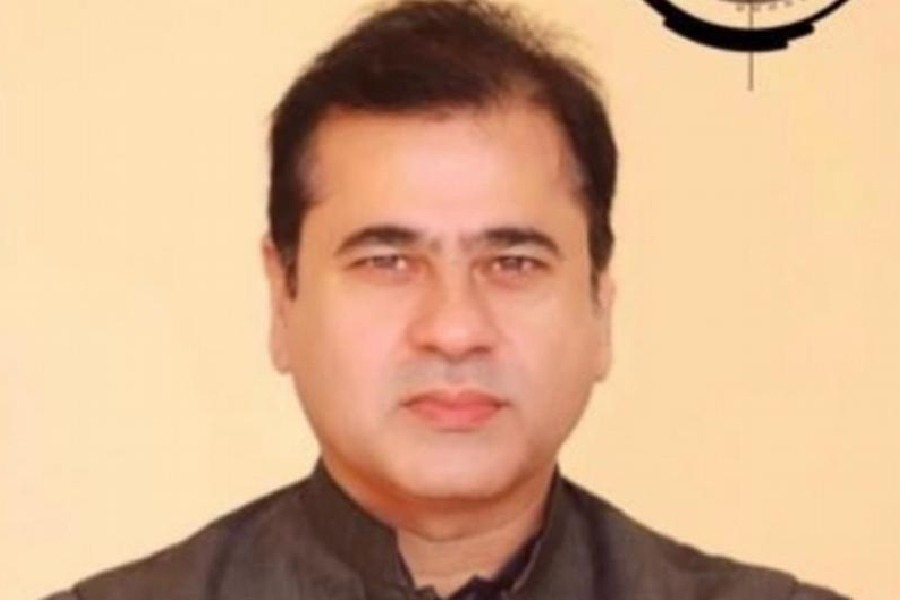The prominent journalist and supporter of ex-PM Imran Khan was detained by the Pakistani police, but the authorities then failed to present him in court.
Imran Riaz, a well-known TV anchor and YouTuber, was among thousands of Imran Khan supporters who were detained following the former premier's arrest and violent protests in Pakistan earlier this month. The journalist was reportedly taken into custody from the airport at the eastern city of Sialkot on May 11 on suspicion of inciting violence. He was due to appear before court in Lahore this Monday.
But then, the story took an an usual turn — authorities failed to present Riaz during the hearing, and Punjab police chief Usman Anwar told the court he was "clueless" about his whereabouts.
The chief justice of the Lahore High Court warned the authorities that "no one will be spared if anything happened" to the 47-year-old reporter.
Riaz's wife Arbab Imran told DW she is worried for her husband's safety.
"The arrest of my husband is deeply troubling. He raised voices for the vulnerable people and for the truth. My four children are concerned about him and we don't know the whereabouts of him. He was taken off-air many times and I demand from authorities for his immediate release," she said.
Pakistan is going through a deep political crisis marked by a power struggle between Imran Khan's Pakistan Tehreek-i-Insaf (PTI) party and the current government led by Prime Minister Shehbaz Sharif, with the military and the judiciary also being affected. Khan has recently stepped up his attacks on the military, accusing it of working against him. Riaz is a well-known media figure among Khan's supporters.
On Tuesday, Reporters Without Border (RSF) representative Daniel Bastard said it was "clearly Pakistan's military intelligence agencies that abducted Imran Riaz" after the Punjabi inspector spoke of unspecified "agencies" during the court hearing.
"According to confidential diplomatic sources consulted by RSF, the government's silence about the TV anchor's fate suggests that he may have fared badly since his abduction and may even have died in detention," the watchdog organization said.
Separately, Amnesty International called for Riaz's immediate recovery.
"On 22 May, the police told the Lahore High Court that there is no trace of him in any police department in the province."
The organization said the events amount to "an enforced disappearance" under international law.
"Punishing dissenting voices using enforced disappearance has been a worrying trend in Pakistan for many years and must be ended," Amnesty said.
Riaz's lawyer Azhar Siddique says that the arrest is a "blatant violation of freedom of expression."
Riaz has decried Imran Khan's ouster from power in April last year, linking it to "regime change" and amplifying Khan's claims that the military was involved in ending his government. The anchor was already arrested twice, in July 2022 and in February 2023. The latter saw Pakistan's Federal Investigation Agency suspect him of hate speech and criticism of the military.
The disappearance of Imran Riaz prompted some in Pakistan to draw parallels with the killing of veteran reporter Arshad Sharif last October. Sharif was well-known for criticizing the Pakistani military and was forced to flee Pakistan in August 2022 to avoid arrest. He was killed in Kenya in what a team of Pakistani investigators described to be a "targeted assassination." The background of the murder remains unclear.
With the country on edge, a disappearance of a prominent journalist is sure to chill other reporters in the country. Journalist Javeria Siddique, the wife of late Arshad Sharif, told DW that Riaz's arrest was "really alarming and a bad optic for freedom of speech in Pakistan."
"The government is arresting journalists over their stories and being vocal," she said, pointing to her husband's murder in Kenya. "Then we have seen the same pattern for Imran Riaz," she added.
"I am requesting from the authorities that they should immediately and unconditionally release the journalist Imran Riaz Khan. Criticizing the ruling elite of Pakistan is not something which falls in hate speech," Siddique added.
Legal expert Osama Malik notes that the freedom of information and the freedom of expression are guaranteed by the Pakistani constitution.
"Imran Riaz's brand of journalism may not be palatable to everyone, but that is certainly not a reason for the state to spirit him away," he told DW. "It is highly condemnable that despite the province's highest court asking about his whereabouts, the law enforcement agencies are unable or unwilling to present Imran Riaz in court or divulge his location."









